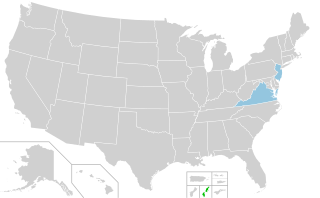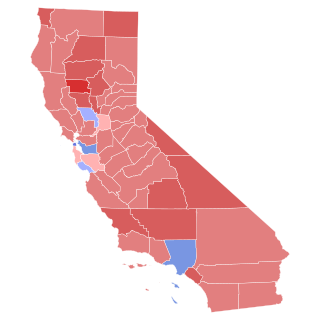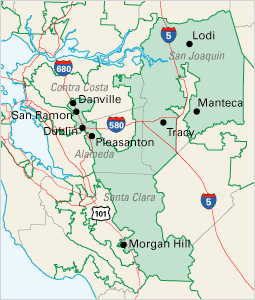
Edmund Gerald Brown Jr. is an American lawyer, author, and politician who served as the 34th and 39th governor of California from 1975 to 1983 and 2011 to 2019. A member of the Democratic Party, he was elected Secretary of State of California in 1970; Brown later served as Mayor of Oakland from 1999 to 2007 and Attorney General of California from 2007 to 2011. He was both the oldest and sixth-youngest governor of California due to the 28-year gap between his second and third terms. Upon completing his fourth term in office, Brown became the fourth longest-serving governor in U.S. history, serving 16 years and 5 days in office.

Edmund Gerald "Pat" Brown was an American lawyer and politician who served as the 32nd governor of California from 1959 to 1967. His first elected office was as district attorney for San Francisco, and he was later elected Attorney General of California in 1950, before becoming the state's governor after the 1958 California gubernatorial election.

The 2006 California gubernatorial election occurred on November 7, 2006. The primary elections took place on June 6, 2006. The incumbent Republican Governor, Arnold Schwarzenegger, won re-election for his first and only full term. His main opponent was California State Treasurer Phil Angelides, the California Democratic Party nominee. Peter Camejo was the California Green Party nominee, Janice Jordan was the Peace and Freedom Party nominee, Art Olivier was the California Libertarian Party nominee, and Edward C. Noonan was the California American Independent Party nominee.

The 2005 United States elections were held on Tuesday, November 8. During this off-year election, the only seats up for election in the United States Congress were special elections held throughout the year. None of these congressional seats changed party hands. There were also two gubernatorial races, state legislative elections in two states, numerous citizen initiatives, mayoral races in several major cities, and a variety of local offices on the ballot.

The 1998 California gubernatorial election was an election that occurred on November 3, 1998, resulting in the election of Lieutenant Governor Gray Davis as the state's first Democratic governor in 16 years. Davis won the general election by an almost 20% margin over his closest opponent, Republican Attorney General Dan Lungren. Davis succeeded Pete Wilson who was term limited.

The 1994 California gubernatorial election was held on November 8, 1994, in the midst of that year's "Republican Revolution". Incumbent Republican Pete Wilson easily won re-election over his main challenger, Democratic State Treasurer Kathleen Brown, the daughter of Pat Brown and younger sister of Jerry Brown, both of whom had previously served as governor. Although Wilson initially trailed Brown in the polls as a result of the state's faltering economy, his signature opposition to affirmative action and state services for illegal immigrants eventually led to his win. Wilson won 25% of the African American vote, a fairly strong performance for a Republican. However, he won only 25% of the Latino vote, a weak performance which was widely attributed to his support of Prop 187. This election was the first California gubernatorial election since 1974 in which the winner of the gubernatorial election was of a different party from the incumbent president.

Evelle Jansen Younger was an American lawyer who served as the California Attorney General from 1971 to 1979. Prior to his career as Attorney General, he served as the district attorney in Los Angeles where he oversaw the prosecutions of both Charles Manson and Sirhan Sirhan. In 1978, he had an unsuccessful run as the Republican Party nominee for Governor of California and retired from politics a year later.

The 1962 California gubernatorial election was held on November 6, 1962. The Democratic incumbent, Pat Brown, ran for re-election against former U.S. vice president and 1960 Republican presidential nominee Richard Nixon. In his concession speech the following morning, Nixon accused the media of favoring his opponent Brown, stating that it was his "last press conference" and "You won't have Nixon to kick around any more." Six years later, Nixon was elected President of the United States, and exactly ten years after this press conference he was re-elected in a landslide.

The 1958 California gubernatorial election was held on Tuesday November 4, Democratic candidate Pat Brown won the first of his two terms as governor of California against Republican senator William Knowland.

The 1970 Maine gubernatorial election took place on November 3, 1970. Incumbent Democratic Governor of Maine Kenneth M. Curtis chose to seek re-election. Curtis won a landslide victory in the Democratic primary. His general election opponent was Maine Attorney General James Erwin, the Republican nominee. Erwin had also easily won his respective party primary and received the Republican nomination for governor. Curtis narrowly defeated challenger in one of the tightest elections in Maine history – the final margin of victory was a mere 890 votes. Curtis received 163,138 votes (50.14%), while Erwin had 162,248 votes (49.86%).

The 2010 Arizona state elections were held on November 2, 2010, with primaries on August 24, 2010. These include gubernatorial and both sides of Congress. A special election was also on May 18 for Proposition 100.

The 1982 United States Senate election in California took place on November 2, 1982. Incumbent Republican U.S. Senator S. I. Hayakawa decided to retire after one term. Republican Pete Wilson, the Mayor of San Diego, won Hayakawa's open seat over Democratic Governor Jerry Brown and several minor candidates.

The 2013 United States elections were held on Tuesday, November 5, 2013. This off-year election cycle featured several special elections to the United States Congress; two gubernatorial races; state legislative elections in a few states; and numerous citizen initiatives, mayoral races, and a variety of other local offices on the ballot.

The 2014 California gubernatorial election was held on November 4, 2014, to elect the Governor of California, concurrently with elections for the rest of California's executive branch, as well as elections to the United States Senate in other states and elections to the United States House of Representatives and various state and local elections.

Redistricting in California has historically been highly controversial. Critics have accused legislators of attempting to protect themselves from competition by gerrymandering districts. Conflicts between the governor and the legislature during redistricting often have only been resolved by the courts.

In California state elections, 2014 was the first year in which the top statewide offices were elected under the nonpartisan blanket primary, pursuant to Proposition 14, which passed with 53% voter approval in June 2010. Under this system, which first went into effect during the 2012 election year, all candidates appear on the same ballot, regardless of party. In the primary, voters may vote for any candidate, regardless of their party affiliation. The top two finishers, regardless of party, then advance to face each other in the general election in November.

The 2018 California State Senate elections were held on Tuesday, November 6, 2018, with the primary election being held on June 5, 2018. Voters in the 20 even-numbered districts of the California State Senate elected their representatives. The elections coincided with the elections of other offices, including for governor and the California State Assembly.

California state elections in 2018 were held on Tuesday, November 6, 2018, with the primary elections being held on June 5, 2018. Voters elected one member to the United States Senate, 53 members to the United States House of Representatives, all eight state constitutional offices, all four members to the Board of Equalization, 20 members to the California State Senate, and all 80 members to the California State Assembly, among other elected offices.

The 1974 California Attorney General election was held on November 5, 1974. Incumbent Republican Evelle J. Younger defeated Democratic nominee William Albert Norris with 55.00% of the vote.

The 1970 California Attorney General election was held on November 3, 1970. Republican nominee Evelle J. Younger defeated Democratic nominee Charles A. O'Brien with 49.28% of the vote.























